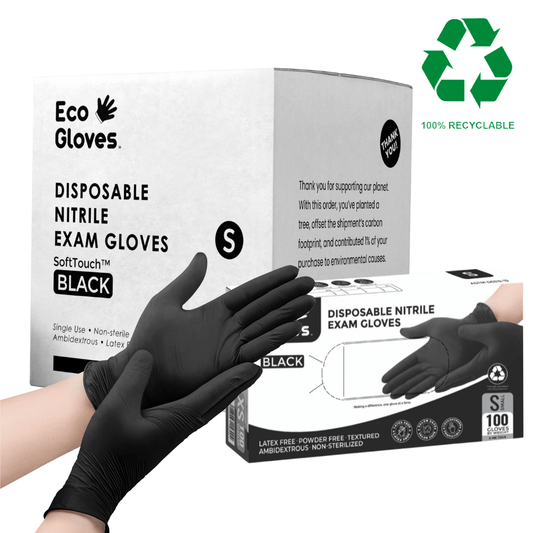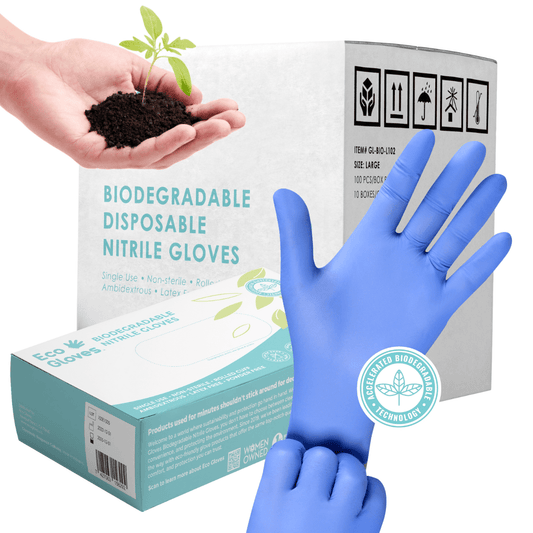The Best Disposable Gloves For Tattoo Artists: Safety, Precision, And Comfort
Eco Gloves
In the world of tattooing, where precision and safety are paramount, the choice of gloves play a critical role. Tattoo artists rely on their hands to create intricate designs, and using suitable disposable gloves ensures they can work safely and effectively.
This article explores the importance of gloves in the tattoo industry, the various disposable gloves available, and why choosing the right gloves is essential for tattoo artists.
Topics Covered
- Why Gloves Are Essential For Tattoo Artists
- Types Of Disposable Gloves For Tattooing
- Benefits Of Nitrile Gloves For Tattoo Artists
- Choosing The Right Gloves
- Safety and Compliance in Tattoo Studios
- Cost and Value of Disposable Gloves in Tattoo Studios
- Relevant Industries
- Invest In The Best For Safety And Precision
- Key Takeaways: Best Disposable Gloves for Tattoo Artists
- Frequently Asked Questions About Tattoo Artist Disposable Gloves
Why Gloves Are Essential For Tattoo Artists
Tattooing is an art form that requires meticulous attention to detail. It also involves dealing with needles, inks, and human skin, which makes hygiene and safety a top priority. Gloves are essential to protecting the tattoo artist and client from potential infection risks.
Hygiene and Safety
Gloves prevent the spread of infections and cross-contamination between clients. In an industry where cleanliness is non-negotiable, gloves are critical to maintaining a sterile environment.
Professionalism
Wearing gloves ensures safety and enhances tattoo artists' professional image. Clients are likely to trust and respect an artist or tattoo establishment that prioritizes health and safety.
Types Of Disposable Gloves For Tattooing
Several disposable gloves are available, each with unique characteristics that make them suitable for different tasks in the tattoo industry.
Nitrile Gloves
Nitrile gloves, known for their puncture resistance, chemical resistance, and hypoallergenic properties, are a top choice for tattoo artists. They provide the strength and durability needed for handling sharp needles and are resistant to the chemicals in tattoo inks and cleaning agents.
Latex Gloves
Latex gloves are favored for their elasticity and snug fit, providing excellent tactile sensitivity. However, they may not be suitable for everyone due to the potential for latex allergies, both in artists and clients.
Vinyl Gloves
Vinyl gloves are a cost-effective option, however, they are less durable than nitrile or latex gloves, and provide less chemical protection than standard nitrile or latex gloves. Additionally, 100% vinyl gloves tend to be stiffer and looser fit, unless they are a mixed hybrid formula, in which these hybrid formulas may provide a good second-skin fit, but you sacrifice thickness, protection, and susceptibility to tears.
Benefits Of Nitrile Gloves For Tattoo Artists
Many tattoo artists prefer nitrile gloves due to their superior qualities that cater specifically to the demands of their craft. Below we explore some of the advantages of nitrile gloves and why many tattoo artists prefer this specific material.
Durability and Strength
Nitrile gloves offer high puncture resistance, crucial when working with needles and other sharp tools. This durability ensures gloves do not easily tear during a tattoo session, maintaining a sterile environment.
Allergy-Free
Unlike latex gloves, which can cause allergic reactions, nitrile gloves are latex-free and hypoallergenic, making them a safer choice for both artists and clients.
Chemical Resistance
Nitrile gloves resist many chemicals, including tattoo inks, solvents, and cleaning agents commonly used in tattoo studios. This resistance is vital for preventing chemical burns or irritation during tattooing, further solidifying nitrile gloves as the go-to choice for professionals in the industry.
Comfort and Fit
Nitrile gloves are designed to be ergonomic and stretchable, offering a comfortable snug fit that allows for flexibility and ease of movement. This is particularly important for artists who spend long hours tattooing and must maintain precision without discomfort.
Tactile Sensitivity
Despite their durability, nitrile gloves provide excellent tactile sensitivity, enabling artists to precisely feel the skin and tattoo machine. This sensitivity is crucial for creating detailed and intricate designs.
Choosing The Right Gloves
Choosing the right gloves involves more than just selecting the appropriate material; it requires careful consideration of several key factors, including size, thickness, texture, and color. These elements are crucial in ensuring that the gloves provide the necessary protection, comfort, and functionality for specific tasks. Let us further explore the specifications tattoo artists should consider when selecting the right gloves for tattoo work.
Sizing and Fit
The correct glove size is essential for comfort and dexterity. Gloves that are too tight can cause hand fatigue, while those that are too loose may reduce precision. Artists should measure their hand's width and length and refer to size charts to find the perfect fit.
Thickness and Texture
Glove thickness can vary, with thicker gloves (gloves between 6 mil to 8 mil thickness) providing more protection and tear resistance, and thinner gloves (gloves 3 mil to 5 mil) offering better sensitivity and dexterity. Tattoo artists should choose based on their specific needs and preferences. Additionally, some gloves come with textured surfaces or fingertips, which can enhance grip and control when handling tools.
Color Options
While the color of gloves does not directly impact the quality of tattoo work, many tattoo artists prefer specific colors for practical and aesthetic reasons that enhance their overall workflow and studio environment. For example, black gloves are commonly chosen because they effectively mask ink stains, blood, and other fluids, helping to maintain a clean and professional appearance during sessions. This not only supports hygiene standards but also prevents distractions caused by visible stains, allowing the artist to remain focused on their craft. On the other hand, some tattoo artists may prefer blue gloves or purple (or blue violet) gloves due to their aesthetic and traditional medical association. Blue gloves have traditionally been preferred to help prevent cross-contamination by making it easier to identify when gloves need to be changed. Ultimately, the choice in glove color comes down to a tattoo artists’ personal preference when they consider functionality, presentation, and the desired atmosphere within a tattoo studio.
Safety and Compliance in Tattoo Studios
Ensuring safety and compliance within tattoo studios is critical for both artists and clients. Tattoo artists must adhere to stringent industry standards and regulations regarding glove use to maintain a hygienic and secure working environment. These regulations are designed to minimize the risk of cross-contamination and protect against bloodborne pathogens, which are of particular concern in environments where skin is being pierced.
Regulatory Standards for Glove Use
Tattoo artists must stay well-informed about the specific regulations that apply to their region, as these can vary widely. For example, in the United States, the Occupational Safety and Health Administration (OSHA) enforces standards that require the use of gloves as part of universal precautions to prevent exposure to potentially infectious materials. In addition, some states have their own specific guidelines, such as California’s Safe Body Art Act, which mandates the use of single-use gloves during the tattooing process to ensure cleanliness and safety.
Staying compliant with these regulations is not only a legal obligation but also a professional responsibility. Regularly reviewing local laws and participating in continuing education can help tattoo artists maintain the highest level of safety in their practice. Moreover, compliance with these standards can enhance a studio's reputation, reassuring clients that they are being tattooed in a safe and regulated environment.
In addition to regulatory compliance, understanding the various types of gloves available—such as nitrile versus latex—can further improve safety. Nitrile gloves are often preferred due to their superior puncture resistance and reduced risk of allergic reactions.
For further details on safety protocols and regulatory requirements, the Alliance of Professional Tattooists (APT) provides extensive resources and guidelines that tattoo artists should regularly consult. This proactive approach to safety ensures that tattoo studios remain compliant and continue to offer a secure environment for both artists and clients.
Proper Usage of Gloves in Tattoo Studios and Disposal
To ensure maximum effectiveness and maintain a safe and hygienic environment, gloves must be used and disposed of properly in tattoo studios. Proper usage involves changing gloves at critical points during the tattooing process. For instance, gloves should be changed between clients to prevent cross-contamination, when transitioning to different parts of the body, and whenever gloves become contaminated or damaged. This practice is essential in protecting both the client and the artist from potential infections and maintaining the integrity of the tattooing process.
Proper Disposal of Gloves for Tattoo Artists
Equally important is the proper disposal of used gloves. Gloves that have been in contact with bodily fluids or other contaminants should be disposed of in designated biohazard waste containers. This step is crucial in preventing the spread of infectious materials and ensuring that the tattoo studio remains a clean and safe environment. According to OSHA guidelines, failing to dispose of contaminated gloves properly can result in significant health risks and legal consequences for the studio.
To further emphasize the importance of proper glove disposal, statistics from the World Health Organization indicate that improper disposal of medical waste, including gloves, can contribute to the spread of infectious diseases. This underscores the need for tattoo studios to follow strict protocols for glove disposal to protect both public health and their professional reputation.
For more detailed information on proper glove usage and disposal practices, as well as compliance with health and safety regulations, tattoo artists and studio owners can refer to resources provided by the CDC and OSHA.
Cost and Value of Disposable Gloves in Tattoo Studios
When selecting disposable gloves for tattooing, it is crucial to consider not only the upfront cost but also the long-term value that high-quality gloves offer. While initial expenses may vary, investing in premium gloves can yield significant benefits in terms of safety, efficiency, and overall client satisfaction.
Cost Comparison: Nitrile vs. Latex and Vinyl Gloves
Nitrile gloves are often more expensive than their latex or vinyl counterparts; however, their superior durability, safety features, and hypoallergenic properties make them a worthwhile investment. Investing in nitrile gloves may initially seem costly, but the long-term benefits, including a reduction in the risk of contamination and enhanced client safety, ultimately offer better value. By ensuring that gloves do not tear or degrade during use, tattoo artists can maintain a consistent level of service, which is critical in an industry where precision and hygiene are paramount.
Long-Term Value: Efficiency and Professionalism
High-quality gloves, such as those made from nitrile, also contribute to improved efficiency in the tattooing process. Their durability reduces the need for frequent glove changes due to tears or discomfort, saving valuable time during sessions. This allows artists to work more seamlessly, maintaining focus on their craft without interruptions. Additionally, clients are likely to appreciate the professional approach of using top-tier protective equipment, further enhancing the studio's reputation.
From a business perspective, the reduced need for frequent glove replacements means lower overall costs in the long run, as fewer gloves are needed per session. This not only contributes to a more cost-effective operation but also aligns with sustainable practices by reducing waste.
Relevant Industries
While this article focuses on tattoo artists, the information is also relevant to other industries that require disposable gloves, such as:
- Tattoo Parlors
- Piercing Studios
- Permanent Makeup Studios
- Tattoo Supply Companies
- Medical and Dental Clinics
Invest In The Best For Safety And Precision
Choosing suitable disposable gloves is not just about compliance; it's about ensuring the safety and comfort of the tattoo artist and the client. With their durability, chemical resistance, and hypoallergenic properties, nitrile gloves are a top choice for professionals who demand the best.
By investing in high-quality gloves, tattoo artists can enhance their performance, ensure client safety, and maintain a professional image. Visit Eco Gloves to explore a range of disposable gloves designed to meet the needs of today's tattoo industry.
Key Takeaways: Best Disposable Gloves for Tattoo Artists
-
Safety & Hygiene First: Gloves protect both artists and clients from infection, cross-contamination, and exposure to bloodborne pathogens.
-
Nitrile Gloves Are the Industry Standard: They offer superior puncture resistance, chemical protection, and hypoallergenic benefits, making them ideal for tattooing.
-
Latex & Vinyl Have Limitations: Latex provides great tactile sensitivity but can cause allergic reactions; vinyl is affordable but less durable and protective.
-
Fit, Thickness & Texture Matter: Proper sizing prevents fatigue, while thickness and texture balance protection, dexterity, and grip during precision work.
-
Color Choice Supports Workflow: Black gloves hide ink stains and maintain a professional appearance, while blue or purple gloves can help with cross-contamination awareness.
-
Regulatory Compliance Is Essential: Following OSHA and local body art regulations ensures safety, professionalism, and legal compliance.
👉 For tattoo artists who value safety, precision, and comfort, Eco Gloves offers premium nitrile gloves — including biodegradable options — designed to meet the demands of professional studios.
Frequently Asked Questions About Tattoo Artist Disposable Gloves
-
Why are nitrile gloves recommended for tattoo artists?
They are puncture-resistant, chemically resistant, and hypoallergenic, making them safer and more durable for tattoo work.
-
Can latex gloves be used for tattooing?
Yes, but they can cause allergic reactions in some clients or artists, so nitrile is generally preferred.
-
How do I choose the right glove size?
Measure your hand’s width and length, then use the manufacturer’s size chart for a snug but comfortable fit.
-
Why do tattoo artists prefer black gloves?
Black gloves hide ink stains and fluids, maintain a professional look, and reduce visual strain under bright studio lighting.
-
How often should gloves be changed during a tattoo session?
Between clients, when switching to a different body part, and whenever gloves are contaminated or damaged.
-
What should I look for in high-quality tattoo gloves?
Durability, puncture resistance, chemical protection, tactile sensitivity, and a comfortable fit.
Related Reading
- Why Estheticians Prefer Nitrile Gloves: A Comprehensive Guide
- A Guide to Nitrile Glove Recycling: Sustainable Practices for Eco-Conscious Businesses
- Choosing the Best Gloves for Hairdressers


















